You are here
New Releases
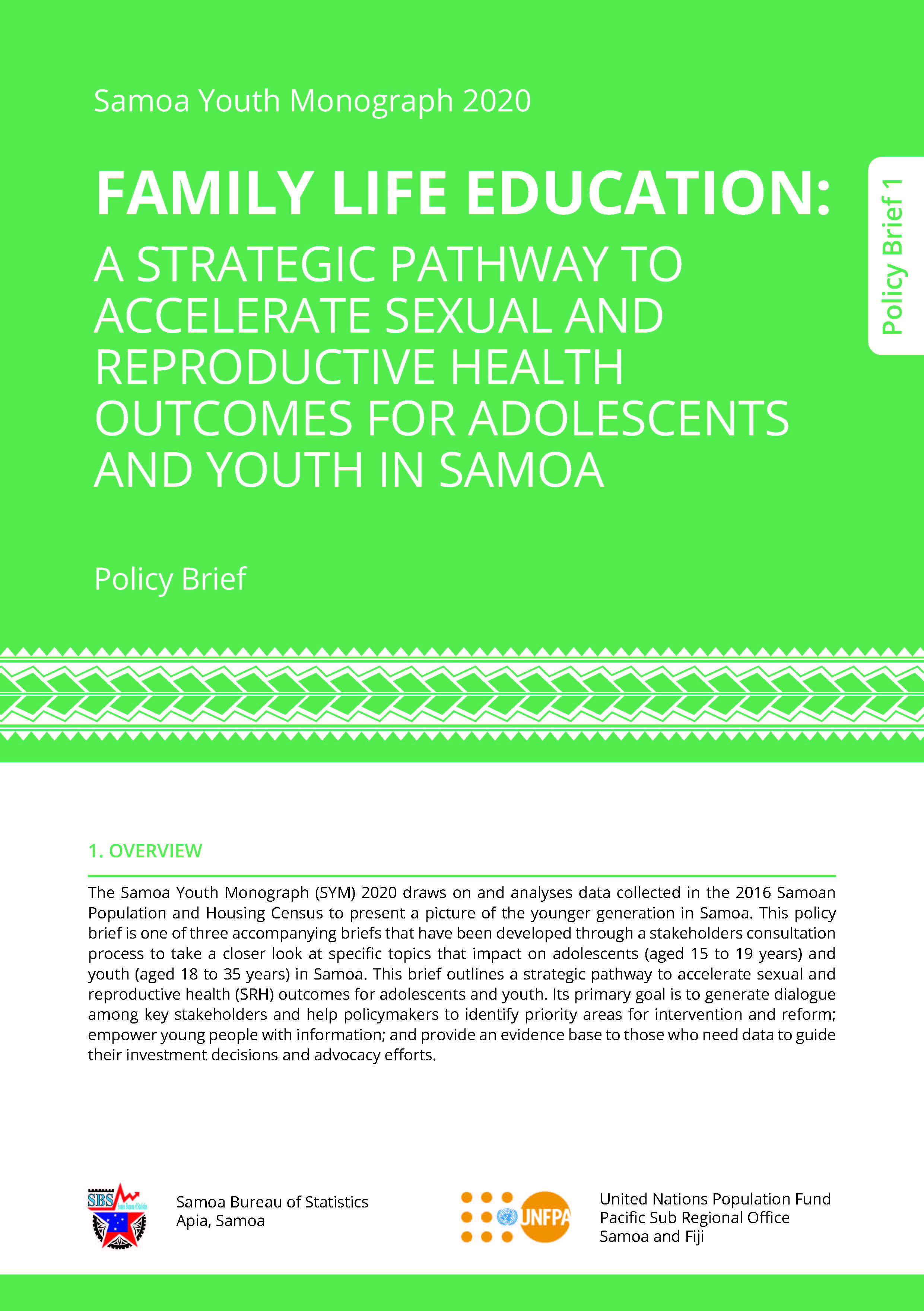
Samoa Youth Monograph 2020 FAMILY LIFE EDUCATION: A STRATEGIC PATHWAY TO ACCELERATE SEXUAL AND REPRODUCTIVE HEALTH OUTCOMES FOR ADOLESCENTS AND YOUTH IN SAMOA Policy Brief
The Samoa Youth Monograph (SYM) 2020 draws on and analyses data collected in the 2016 Samoan Population and Housing Census to present a picture of the younger generation in Samoa. This policy brief is one of three accompanying briefs that have been developed through a stakeholders consultation process to take a closer look at specific topics that impact on adolescents (aged 15 to 19 years) and youth (aged 18 to 35 years) in Samoa. This brief outlines a strategic pathway to accelerate sexual and reproductive health (SRH) outcomes for adolescents and youth. Its primary goal is to generate dialogue among key stakeholders and help policymakers to identify priority areas for intervention and reform; empower young people with information; and provide an evidence base to those who need data to guide their investment decisions and advocacy efforts.
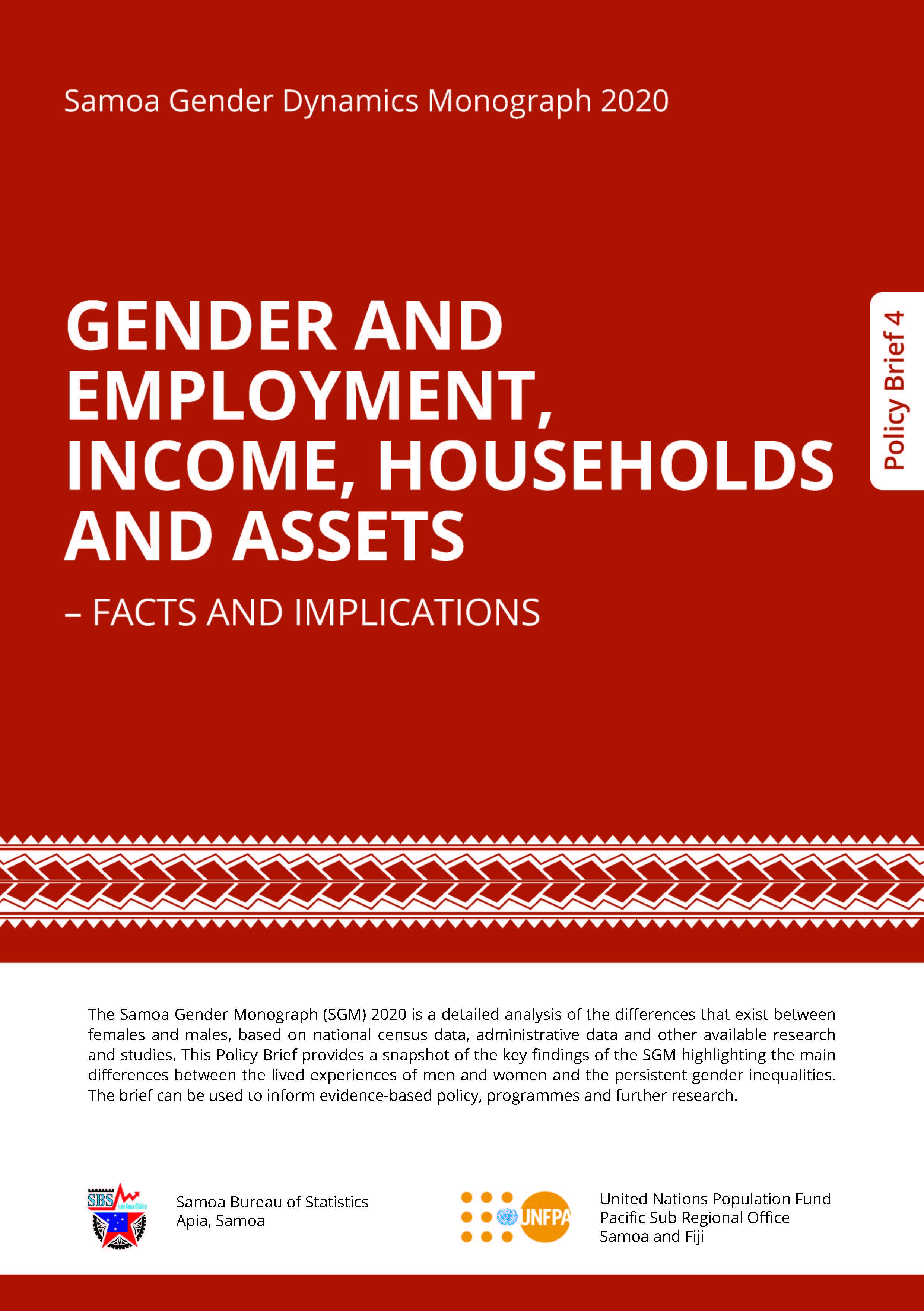
Samoa Gender Dynamics Monograph 2020 GENDER AND EMPLOYMENT, INCOME, HOUSEHOLDS AND ASSETS – FACTS AND IMPLICATIONS
The Samoa Gender Monograph (SGM) 2020 is a detailed analysis of the differences that exist between females and males, based on national census data, administrative data and other available research and studies. This Policy Brief provides a snapshot of the key findings of the SGM highlighting the main differences between the lived experiences of men and women and the persistent gender inequalities. The brief can be used to inform evidence-based policy, programmes and further research.
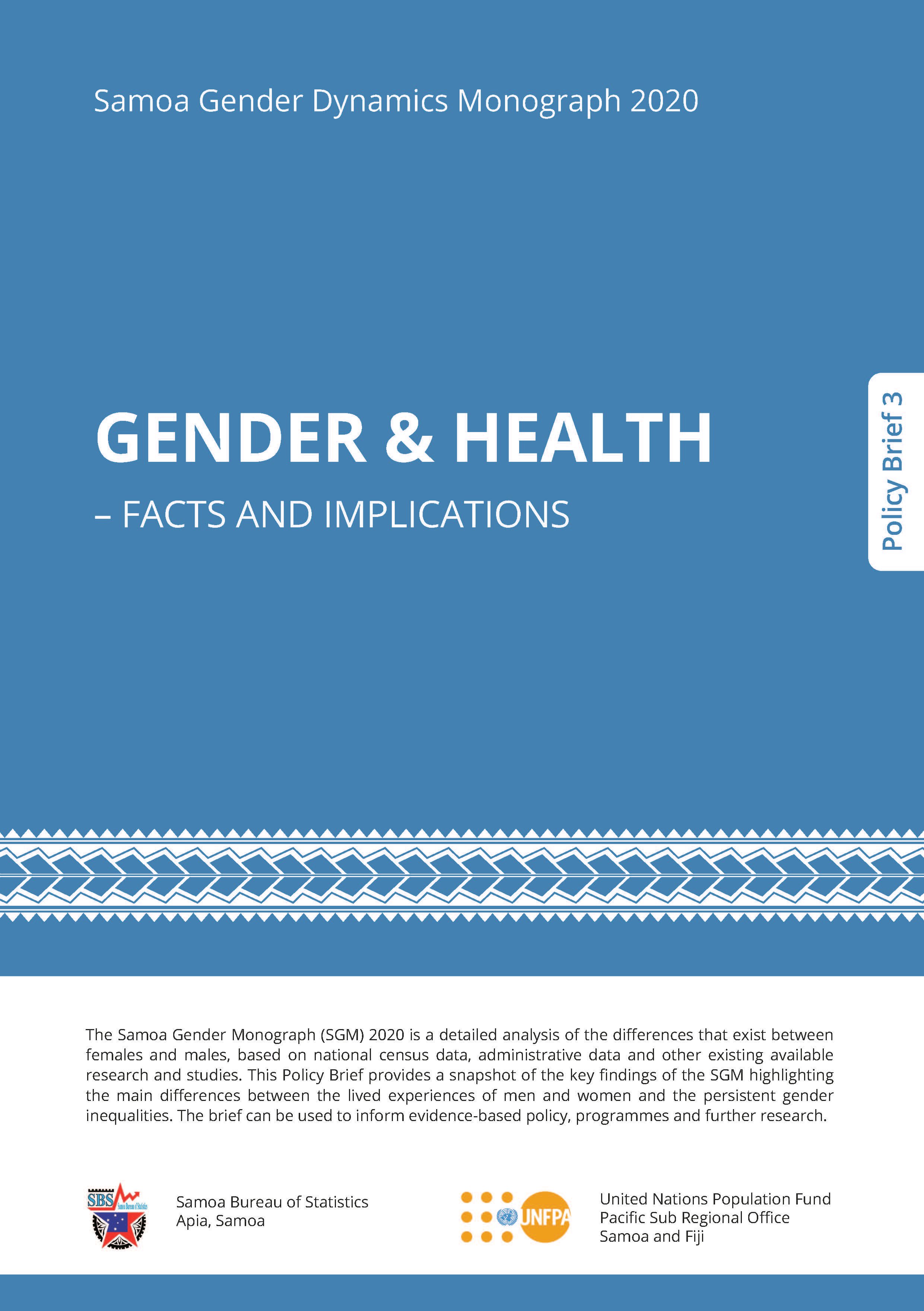
Samoa Gender Dynamics Monograph 2020 GENDER & HEALTH – FACTS AND IMPLICATIONS
The Samoa Gender Monograph (SGM) 2020 is a detailed analysis of the differences that exist between females and males, based on national census data, administrative data and other existing available research and studies. This Policy Brief provides a snapshot of the key findings of the SGM highlighting the main differences between the lived experiences of men and women and the persistent gender inequalities. The brief can be used to inform evidence-based policy, programmes and further research.
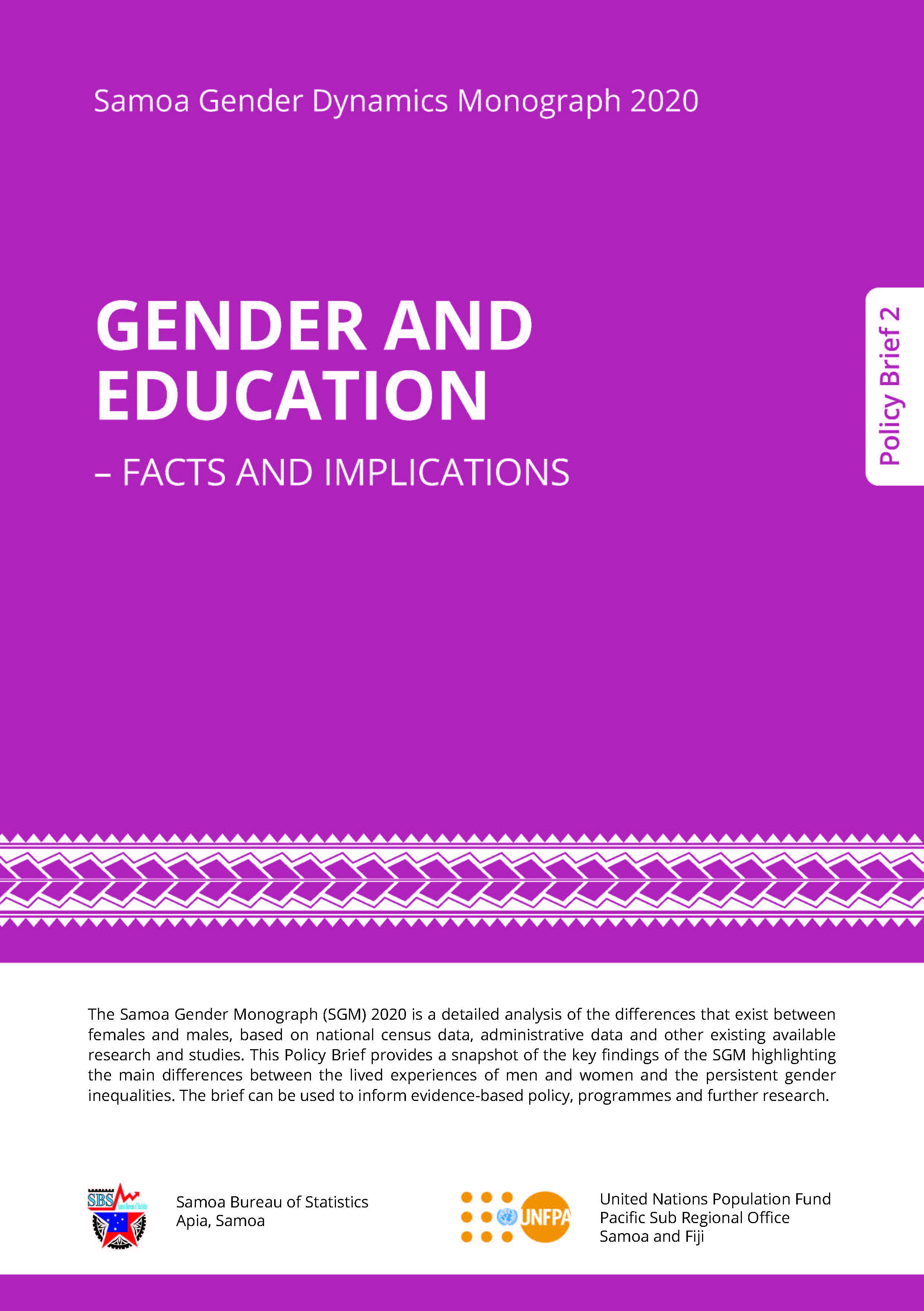
Samoa Gender Dynamics Monograph 2020 GENDER AND EDUCATION – FACTS AND IMPLICATIONS
The Samoa Gender Monograph (SGM) 2020 is a detailed analysis of the differences that exist between females and males, based on national census data, administrative data and other existing available research and studies. This Policy Brief provides a snapshot of the key findings of the SGM highlighting the main differences between the lived experiences of men and women and the persistent gender inequalities. The brief can be used to inform evidence-based policy, programmes and further research.
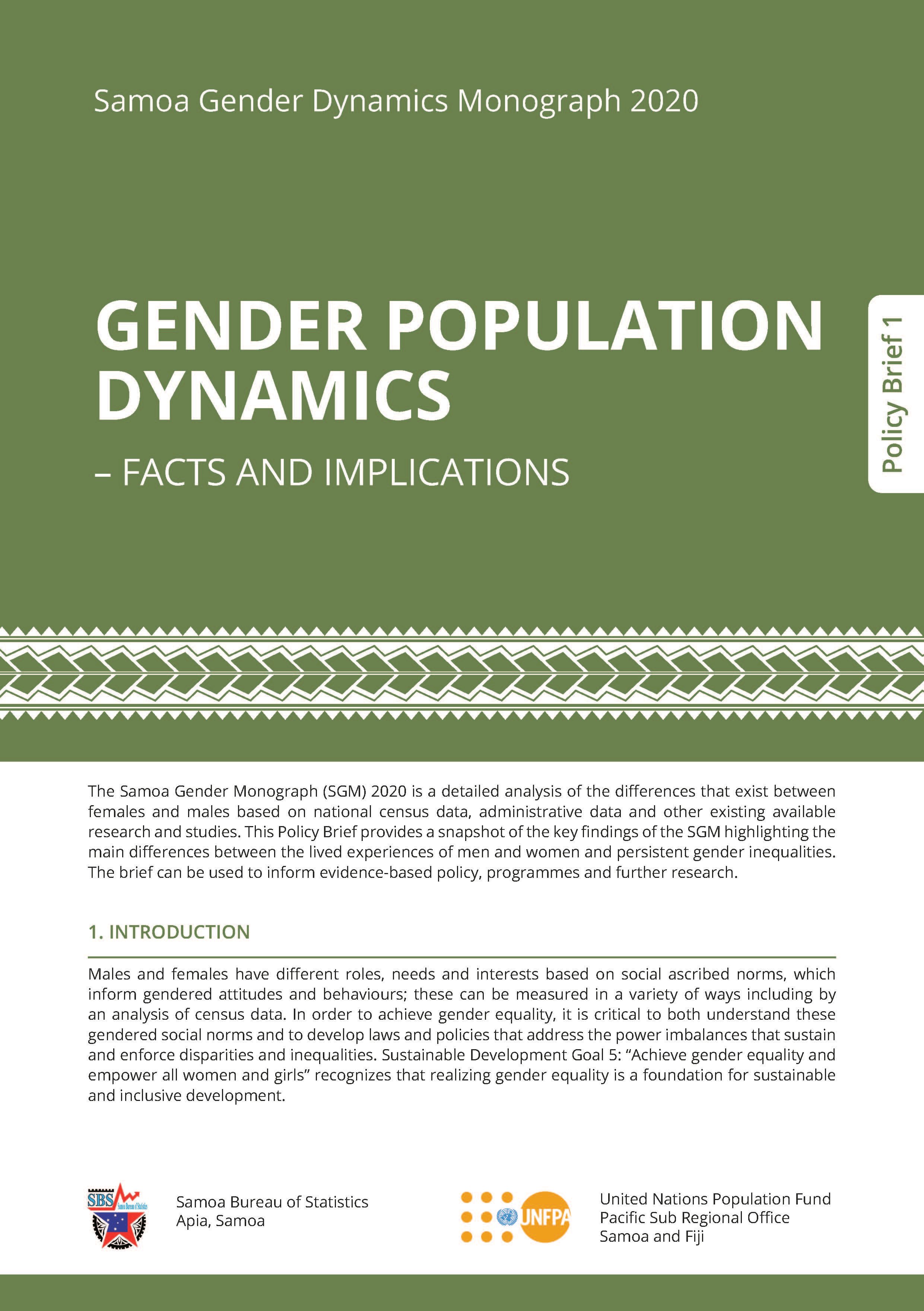
Samoa Gender Dynamics Monograph 2020 GENDER POPULATION DYNAMICS – FACTS AND IMPLICATIONS
The Samoa Gender Monograph (SGM) 2020 is a detailed analysis of the differences that exist between females and males based on national census data, administrative data and other existing available research and studies. This Policy Brief provides a snapshot of the key findings of the SGM highlighting the main differences between the lived experiences of men and women and persistent gender inequalities. The brief can be used to inform evidence-based policy, programmes and further research.
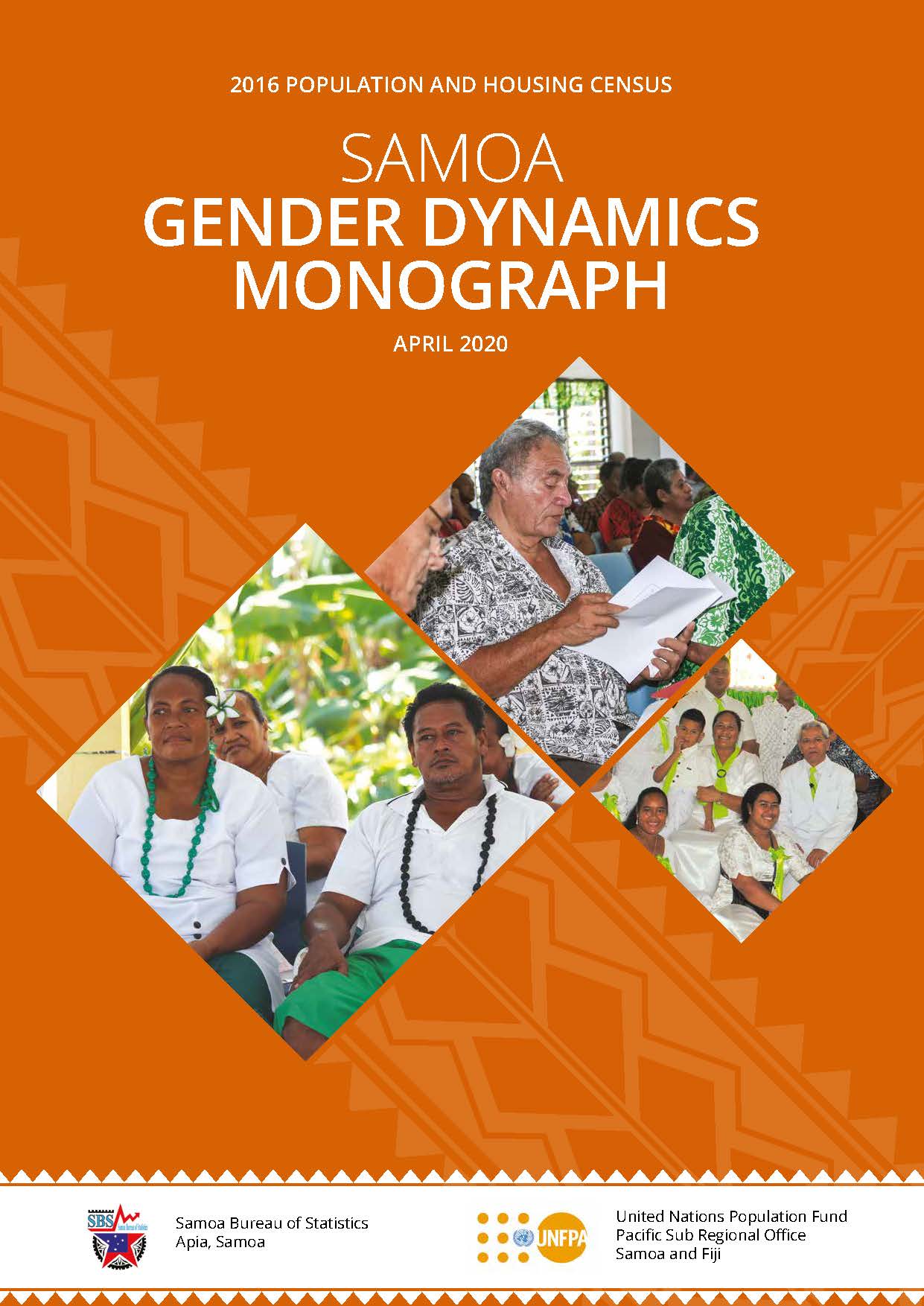
SAMOA GENDER DYNAMICS MONOGRAPH 2020
With the strong sentiments of “leaving no one behind” and “reaching the furthest behind” the Sustainable Development Goals (SDGs) have put gender inequality at the forefront and centre of sustainable and inclusive development. Sustainable Development Goal (SDG) 5: “Achieve gender equality and empower all women and girls” recognizes that women and girls worldwide face many challenges that limit their full participation in social-political and economic development opportunities. Women, children, and people living with a disability, including those living in isolated and hard-to-reach communities, are often the most marginalized members of a society and are therefore most vulnerable
and at risk of being left furthest behind in accessing services, basic needs, and many other opportunities. The Government of Samoa has acknowledged the existence of gender inequality in Samoa. The Strategy for the Development of Samoa 2016-2020 stipulates under Outcome 8.1 that the: “Inclusion of vulnerable groups (women, youth, people with disabilities, children, elderly and disadvantaged people) in community planning and governance activities will be enhanced”. The United Nations Population Fund (UNFPA) further recognizes that the empowerment of all women and girls, and the realization of reproductive rights in both development and humanitarian settings, is essential to advance gender equality and achieve universal access to sexual and reproductive health by 2030, as well as to realize its strategic vision of zero maternal mortality; zero unmet need for family planning; and zero gender-based violence (GBV) by 2030. One of the many ways in which UNFPA supports countries, including Samoa, in their efforts towards achieving the 2030 Agenda and gender equality is through strengthening national data capabilities. This includes the generation of effective and reliable population data, disaggregated by sex, and analysis to use demographic intelligence for evidence-based policy, advocacy and programming. This gender monograph provides a detailed analysis of the social differences that exist between females and males in Samoa based on available national census data and information, administrative data and information, and other existing available research and studies. The evidence-based analyses of national census data and other available information presented in this monograph, confirms that gender inequalities and disparities exist in our society and need addressing. This monograph further provides recommendations on key areas for policy and programme considerations to address gender inequality in Samoa.
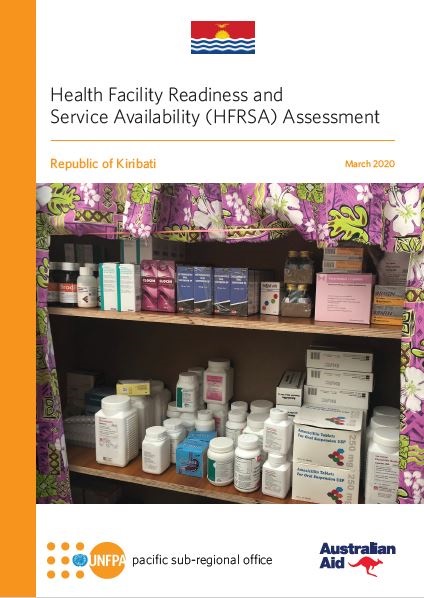
Kiribati Health Facility Readiness and Service Availability (HFRSA) Assessment
Health Facility and Readiness Service Assessment was conducted in all health facilities in Kiribati from March to September in 2019. This is to measure the level of service each facility provides in terms of infrastructure, capacity, skills, knowledge and equipment and the accessibility of these services at the different levels within the Public Health clinics, Health centres and all hospitals. The HFRSA aimed to identify the strengths, gaps and issues for all health services provided at each level and to provide measurable recommendations to address and improve these services. In support of “leaving no one behind” the 2030 agenda, the results of this assessment will provide the baseline for good governance and good planning in improving and strengthening a quality integrated healthcare services provided at all levels for sexual reproductive health and to ensure rights and choices for all is well met, encompassing universal health coverage for all.
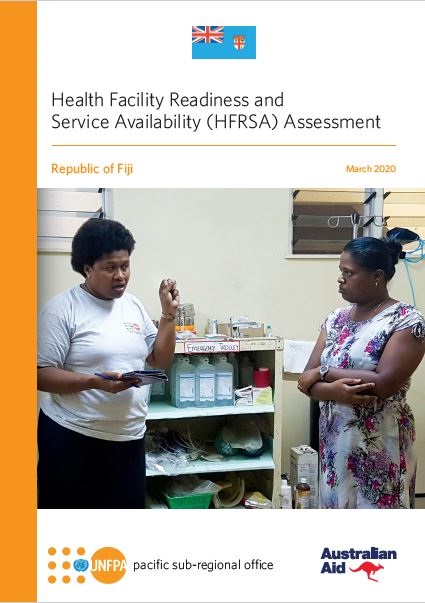
Fiji Health Facility Readiness and Service Availability (HFRSA) Assessment
The main aim for the Health Service Reediness and services Availability survey was to establish a baseline for readiness of health facilities and service availability in areas of Maternal, Sexual & Reproductive Health, and Adolescent Health services inclusive of Gender based violence and Disability friendly services. The findings of the survey recommendation would then serves as basis for formation of new policy and strategic direction of The Ministry of Health & Medical Services in the specific areas of the study. The survey would also assist the Ministry to advocate for finding support to implementation of the recommendation for improvement of service delivery. The HFRSA assessment was designed as a census using an instrument that includes observations of physical inventory and tools (i.e. guidelines, job-aids), records and reports (i.e. stock cards, clinical registers, health management information systems reports (HMIS), as well as interviews with service providers at the sites. The survey was based on what was available on that day with retrospective focus on data and rule out periods of stock out of supplies.
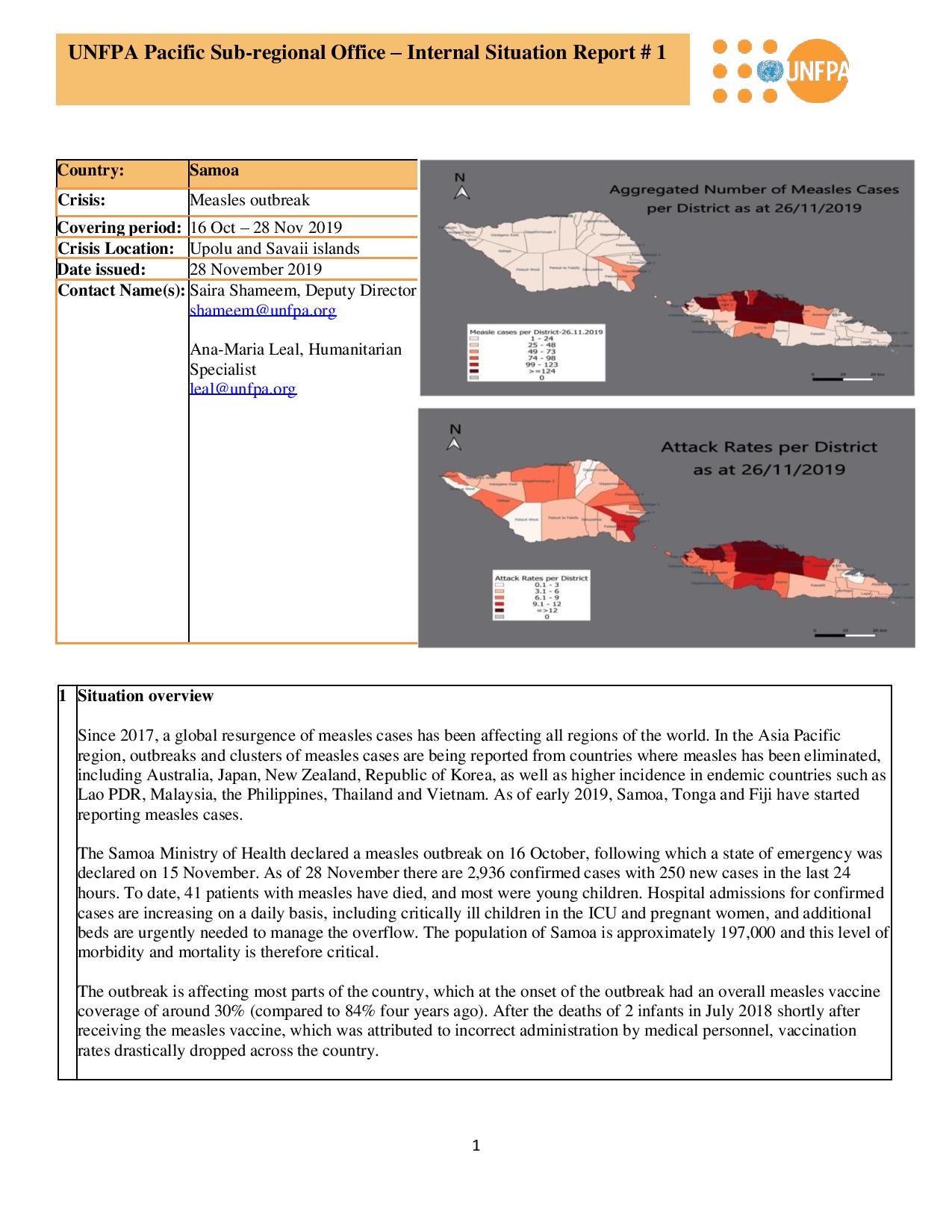
UNFPA Situation Report #1 Samoa Measles Outbreak
The Government of Samoa declared a state of emergency on 15 November due to the escalating measles outbreak. In response to the state of emergency, the Pacific Sub-Regional Office of the United Nations Population Fund, has provided reproductive health kits to the Government of Samoa for women of reproductive age, including pregnant women and those with newborns, amid the ongoing measles outbreak.
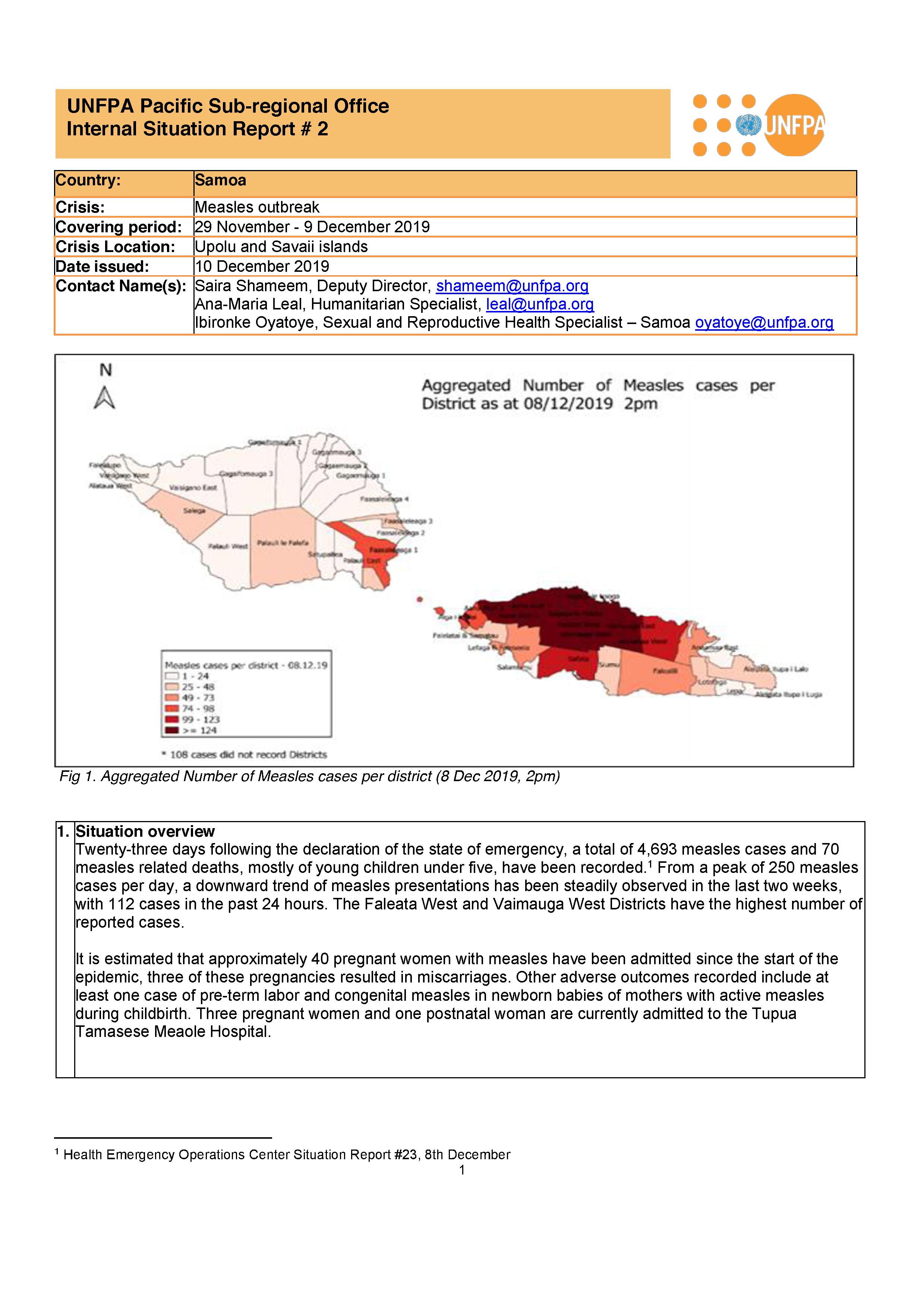
UNFPA Situation Report #2 Samoa Measles Outbreak
The Government of Samoa declared a state of emergency on 15 November due to the escalating measles outbreak.In response to the state of emergency, the Pacific Sub-Regional Office of the United Nations Population Fund, has provided reproductive health kits to the Government of Samoa for women of reproductive age, including pregnant women and those with newborns, amid the ongoing measles outbreak.